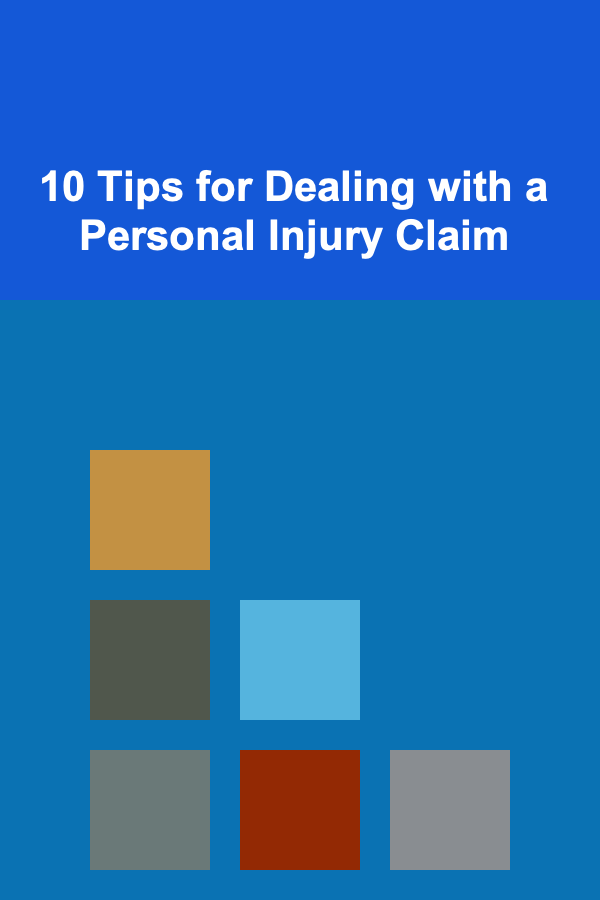
10 Tips for Dealing with a Personal Injury Claim
ebook include PDF & Audio bundle (Micro Guide)
$12.99$5.99
Limited Time Offer! Order within the next:

Dealing with a personal injury claim can be a complex and stressful process, especially if you are facing physical and emotional challenges in the aftermath of an accident. Whether it is a car accident, slip and fall, workplace injury, or any other type of personal injury, understanding the process and knowing how to navigate it can significantly impact the outcome of your claim.
In this article, we'll provide ten practical tips to help you deal with a personal injury claim effectively. These tips will guide you through every stage of the process, from documenting the injury to dealing with insurance companies, and even when it might be necessary to involve a lawyer.
Seek Medical Attention Immediately
The first and most important step after sustaining an injury is to seek medical attention. Even if your injuries seem minor at first, some conditions may not show symptoms immediately but can worsen over time.
Why Medical Attention is Crucial
- Establishes a medical record: Medical documentation is essential when filing a personal injury claim. It serves as evidence to demonstrate the nature and extent of your injuries.
- Ensures proper treatment: Timely medical attention can help you recover faster and avoid complications. If you wait too long to seek treatment, the insurance company may argue that your injuries were not as serious as you claim or that they were caused by something other than the accident.
- Protects your health: Immediate medical attention ensures you receive the right treatment and avoid aggravating your injuries.
Tips for Medical Documentation
- Visit your doctor or emergency room as soon as possible after the incident.
- Keep detailed records of all medical visits, treatments, and prescriptions.
- If you miss a visit, make sure to document the reasons why and reschedule as soon as possible.
- If your injuries worsen over time, make sure to update your doctor's notes regularly.
Document the Incident and Your Injuries
The more detailed and comprehensive your documentation, the stronger your personal injury claim will be. This includes documenting the circumstances surrounding the accident, your injuries, and any related incidents.
What to Document
- Accident details: Write down the time, date, location, and any factors that may have contributed to the accident. If there were any witnesses, get their contact information.
- Photographs: Take photographs of the accident scene, your injuries, and anything that could be relevant to the case, such as road conditions, faulty equipment, or dangerous premises.
- Pain and suffering: Keep a journal documenting your pain levels, emotional distress, and how the injury affects your daily life.
- Medical records: As mentioned earlier, medical documentation is essential. Keep copies of all medical bills, diagnoses, prescriptions, and reports.
Tips for Gathering Evidence
- If the accident occurred in a public space or involved another party (such as a car accident), consider collecting contact information from witnesses.
- If it was a workplace injury, ensure that your employer is aware of the incident and has filed a report.
- Use your phone to take photos immediately after the incident. Don't wait---details may change or fade over time.
Notify Your Insurance Company
After you've received medical attention and documented the incident, notify your insurance company about the accident. Whether it's your own insurance company or the at-fault party's insurer, informing them promptly will help initiate the claims process.
Why Notify the Insurance Company
- Fulfills legal requirements: Some insurance policies require you to report an accident within a certain time frame to remain eligible for coverage.
- Starts the claims process: By reporting the incident, you begin the process of filing a claim. The insurer will then assess the situation, investigate the accident, and determine how much compensation you may be entitled to.
- Protects your rights: Notifying your insurance company ensures that you're not caught off guard if the other party's insurer contacts you or if they attempt to deny liability.
How to Notify Your Insurance Company
- Be honest about the details of the accident but avoid giving unnecessary information.
- Do not admit fault or make statements that could be construed as an admission of liability.
- Provide accurate information, such as medical records and police reports, if applicable.
Avoid Giving Recorded Statements Without Legal Advice
Insurance companies often ask for recorded statements to get your side of the story. While it may seem like a harmless request, it can work against you if not handled properly.
Why You Should Avoid Giving a Statement
- Statements can be used against you: Insurance adjusters may ask leading questions to get you to say something that weakens your claim or implies that you are partially at fault for the accident.
- You may not know all the details yet: At the time of giving a statement, you may not have full knowledge of the extent of your injuries or the consequences of the accident.
- Your words can be twisted: Anything you say can be used as evidence in the case, and even a small mistake could hurt your claim.
What to Do Instead
- Politely inform the insurance company that you prefer to consult with an attorney before giving a recorded statement.
- If you've already given a statement, consider reviewing it with a lawyer to ensure it's consistent with your medical records and other evidence.
Keep Track of Expenses and Losses
Your personal injury claim is not just about the physical injuries you sustained---it's also about the financial impact of the accident on your life. Keeping track of all expenses and losses is critical for calculating the total value of your claim.
Types of Expenses to Track
- Medical bills: Document every visit to the doctor, hospital, physical therapist, or any other medical provider. This includes not only treatment costs but also transportation and medications.
- Lost wages: If your injury prevents you from working, keep detailed records of the time you've missed, including pay stubs, tax returns, and any employer correspondence.
- Pain and suffering: While more difficult to quantify, you can still keep a journal of your pain levels and emotional suffering. This can help your lawyer argue for non-economic damages.
- Future medical expenses: If your injury requires long-term care or therapy, track future expenses that will be incurred due to the injury.
How to Keep Records
- Use a folder or binder to keep all receipts, bills, and records organized.
- Write down any missed workdays and how the injury affects your ability to perform tasks.
- If possible, gather any correspondence from your employer regarding time off or job restrictions.
Understand the Role of Comparative Fault
In some cases, your injury claim may be reduced if you are partially at fault for the accident. This is known as comparative fault or contributory negligence, and it can significantly affect the outcome of your case.
What is Comparative Fault?
Comparative fault is a legal doctrine that allows damages to be divided based on the degree of fault of each party involved in the accident. If you are found partially responsible for the incident, your compensation may be reduced proportionally to your percentage of fault.
How It Affects Your Claim
- In shared liability cases: If you were partially at fault for the accident, the amount you are entitled to may be reduced. For example, if you are found to be 30% at fault for a car accident, your claim may only cover 70% of your damages.
- Shared fault in slip and fall cases: In a slip-and-fall case, if the property owner can prove that you were negligent (e.g., not paying attention or ignoring warning signs), your claim may be affected.
How to Protect Yourself
- Be mindful of what you say and avoid admitting fault at the scene or in your statement to the insurance company.
- Work with an attorney to ensure that you are not unfairly held liable for part of the accident.
Consider Hiring a Personal Injury Lawyer
Hiring an experienced personal injury lawyer can be one of the best decisions you make during the claims process. A lawyer can help navigate the complexities of your case, especially if liability is disputed or the injury is severe.
Why You Should Hire a Lawyer
- Expertise: Personal injury lawyers are experts in handling injury claims. They know the ins and outs of the legal system and can handle all the paperwork, negotiations, and legal hurdles.
- Maximizing compensation: A lawyer will help ensure that you receive the full compensation you deserve, including for non-economic damages such as pain and suffering.
- Dealing with insurance companies: Insurance companies have teams of adjusters working for them, and having a lawyer on your side levels the playing field.
How to Choose the Right Lawyer
- Look for a lawyer with experience in personal injury cases similar to yours.
- Check reviews and ask for referrals from friends or family.
- Ensure the lawyer works on a contingency fee basis, meaning they only get paid if you win the case.
Stay Patient and Avoid Rushing the Process
Personal injury claims can take time to resolve, especially if negotiations with the insurance company or court proceedings are involved. It's important to stay patient and not rush into a settlement just to close the case quickly.
Why Patience is Important
- Rushed settlements may result in lower compensation: Settling too quickly may mean you're not fully compensated for your injury, especially if you don't know the full extent of the damages or future medical costs.
- You may not know the full impact yet: Sometimes the effects of an injury don't fully manifest until weeks or months later. Rushing the process might mean you miss out on future compensation.
Tips for Staying Patient
- Keep up with your medical treatment and attend follow-up appointments.
- Stay in touch with your lawyer, who will keep you updated on any developments.
- Don't settle until you've had enough time to fully assess your injuries and losses.
Prepare for Settlement Negotiations
If your claim reaches the settlement stage, you will enter negotiations with the insurance company or the responsible party. Knowing what to expect can help you prepare and secure a fair outcome.
Settlement Tips
- Know the value of your claim: Work with your lawyer to determine a fair settlement amount based on your medical expenses, lost wages, and pain and suffering.
- Don't accept the first offer: Insurance companies often make low initial offers. Be prepared to negotiate and don't settle for less than what you deserve.
- Consider long-term costs: If you have ongoing medical treatments or permanent injuries, ensure that the settlement covers these long-term expenses.
How to Negotiate
- Be firm but reasonable when discussing your settlement.
- Keep all your documentation and evidence handy to support your claims.
Finalize the Claim and Close the Case
Once you've reached a settlement or won a court case, you'll need to finalize your personal injury claim. This involves signing a release of liability, which prevents you from filing further claims regarding the same injury.
Final Steps in Closing the Case
- Review the settlement carefully: Ensure that the settlement covers all your damages, including medical bills, lost wages, pain and suffering, and future costs.
- Sign the release of liability: This document officially closes your case, so make sure you understand its terms before signing.
- Distribute the funds: Once the settlement is finalized, the funds will be distributed to you, minus any lawyer's fees or costs associated with the case.
Dealing with a personal injury claim can be overwhelming, but with the right knowledge, preparation, and legal support, you can navigate the process and secure the compensation you deserve. By following these ten tips, you'll be well-equipped to handle the claims process and move forward with your recovery.
Reading More From Our Other Websites
- [Home Holiday Decoration 101] How to Personalize Your Holiday Decor for an Extra Special Celebration
- [Sewing Tip 101] Upcycling with Notions: Turning Old Trim into New Sewing Projects
- [Organization Tip 101] The Benefits of Adding a Safe Room to Your Home for Peace of Mind
- [Biking 101] Top 5 Bike Trailers for Family Adventures and Cargo Transport
- [Home Security 101] How to Choose Budget-Friendly Home Security Cameras That Don't Break the Bank
- [Home Rental Property 101] How to Write a Clear and Effective Lease Agreement
- [Metal Stamping Tip 101] How to Choose the Right Lubricants for Fine‑Detail Metal Stamping Operations
- [Organization Tip 101] How to Organize Your Children's Books for Easy Access
- [Digital Decluttering Tip 101] How to Create a Foolproof #‑@‑! Backup Plan for All Your Data
- [Personal Finance Management 101] How to Leverage Technology to Track Your Financial Progress

How to Make Money Online as a Web Developer: 10 Actionable Ideas
Read More
How to Optimize Your Laundry Room for Better Storage
Read More
How to Utilize Community Resources for Financial Help
Read More
Developing a Killer Niche Marketing Strategy
Read More
How to Draft a Simple Will in 5 Steps
Read More
10 Tips for a Minimalist New Year's Resolution To-Do List
Read MoreOther Products

How to Make Money Online as a Web Developer: 10 Actionable Ideas
Read More
How to Optimize Your Laundry Room for Better Storage
Read More
How to Utilize Community Resources for Financial Help
Read More
Developing a Killer Niche Marketing Strategy
Read More
How to Draft a Simple Will in 5 Steps
Read More